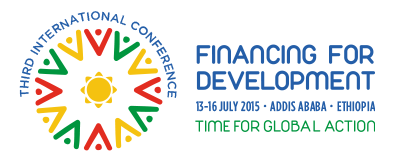Civil society and other stakeholders issued policy briefs and articles with proposals and recommendations on financing development in the post-2015 era.
The interventions take up: the potential role of the Global Financing Facility mechanism (GFF); the case for an intergovernmental UN tax body; ensuring taxation is pro-poor; the evolution of the draft outcome document of the Third International Conference on Financing for Development (FfD 3); accountability for the FfD 3 outcome; and defining success at FfD 3.
 July 2015: Civil society and other stakeholders issued policy briefs and articles with proposals and recommendations on financing development in the post-2015 era. The interventions take up: the potential role of the Global Financing Facility mechanism (GFF); the case for an intergovernmental UN tax body; ensuring taxation is pro-poor; the evolution of the draft outcome document of the Third International Conference on Financing for Development (FfD 3); accountability for the FfD 3 outcome; and defining success at FfD 3.
July 2015: Civil society and other stakeholders issued policy briefs and articles with proposals and recommendations on financing development in the post-2015 era. The interventions take up: the potential role of the Global Financing Facility mechanism (GFF); the case for an intergovernmental UN tax body; ensuring taxation is pro-poor; the evolution of the draft outcome document of the Third International Conference on Financing for Development (FfD 3); accountability for the FfD 3 outcome; and defining success at FfD 3.
The new Global Financing Facility (GFF), a mechanism initiated by the World Bank and the Governments of Canada, Norway and the US, could serve as a model for financing the Sustainable Development Goals (SDGs), writes Jens Marten on the Global Policy Watch blog. The GFF is expected to play a key role in financing the proposed SDG on healthy lives. It will operate at a country-level through multi-stakeholder platforms led by the national government with full involvement of civil society, the private sector and donor organizations.
Thirty NGOs outline ‘Ten Reasons Why an Intergovernmental UN Tax Body Will Benefit Everyone’ in a blog post on Global Policy Watch. These are: such a body as a key step towards a coherent global system; stronger cooperation between tax administrations; less universal action; ending the race to the bottom; better business environment; a level playing field; stronger implementation; less double taxation and double-non-taxation; more financing for development in the poorest countries; and fair and consistent global action against tax havens. The Financial Transparency Coalition (FTC) argues that a universal, well-resourced, UN Intergovernmental Tax Body is in everyone’s interest and is best addressed at FfD 3. It recommends addressing illicit financial flows through: public country-by-country reporting for MNCs; public beneficial ownership registries; and automatic exchange of information with application of common but differentiated responsibilities (CBDR) to assist low capacity countries.
Andrew Wainer, Save the Children, discusses increasing momentum on ‘taxes for development’ and domestic resource mobilization (DRM). To ensure taxation is pro-poor, he stresses the importance of strong country leadership and demonstrated, authentic political will to improve tax collection and spending; long-term support for the process; donor coordination and coherence; and inclusion of civil society to help hold revenue generating agencies more accountable and transparent.
The late June version of the FfD 3 draft outcome document appears to have shifted away from solid commitments, especially with numbers, observes Charles Kenny of the Center for Global Development. He analyzes some of the text changes on a global social compact, tax targets, tobacco tax, procurement transparency, aid graduation policies, migration and infrastructure and recommends the final agreement add meaningful specifics.
Stakeholder Forum developed Six Financial Fitness Tests to serve as an accountability tool to ensure that the FfD outcome is fit for purpose to finance the achievement of the proposed SDGs. The tests are: getting the prices right; getting incentives right; securing capital; systemic transparency; sustainable finance standards, including hard and soft standards to facilitate sustainable capital markets; and sustainable demand for sustainable finance, including the development of sufficient financial and sustainability literacy. Stakeholder Forum intends to use its assessment methodology to analyze the FfD outcome and provide a scorecard of the process, including areas and themes for further work in other fora.
During an event at the Council on Foreign Relations (CFR), Elizabeth Cousens, UN Foundation, said FfF 3 is more than just the negotiated document. She explained that success would include a “reframe[ing of] our understanding of how you invest in developments,” including using ODA more smartly and maximizing the development impact of flows, including DRM. [Global Policy Watch Blog on GFF] [Global Policy Watch Blog on Tax Body] [Save the Children Blog] [FTC Recommendations] [Center for Global Development Blog] [Stakeholder Forum Six Financial Tests] [Transcript of CFR Event]